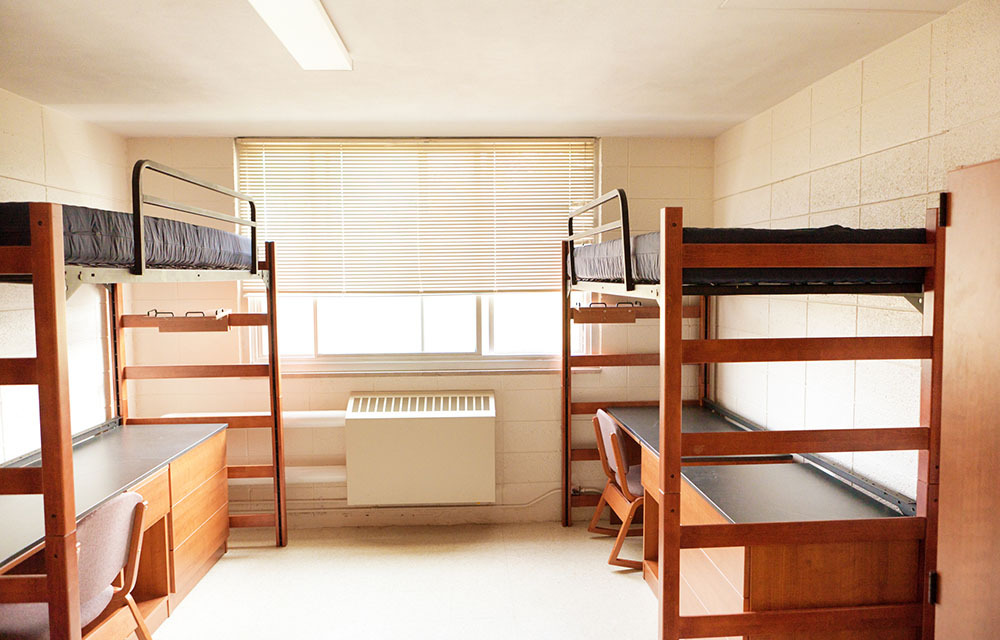Community colleges can leverage a number of creative strategies and partnerships to provide long-term housing solutions for the unique student populations they serve.
Student Parents: The Power of Wraparound Supports
This article is a collaboration between the Federal Reserve Bank of Richmond and the Annie E. Casey Foundation.
Wraparound Services at Community Colleges
Many community college students juggle work and family responsibilities alongside their academic pursuits. Wraparound services — such as transportation assistance, child care, mental health counseling and housing — help students meet their nonacademic needs, which improves colleges' retention and completion rates. These services also attract adult learners, a key population of community college students.
As we have written about previously, funding wraparound services is complicated. Community colleges rely heavily on local, state, and federal funding for their academic programs, but this funding does not cover the full range of wraparound services that colleges need to foster student success. Instead, colleges rely on a combination of funding sources, ranging from state and federal grants, private or foundation funds, and partnerships with local organizations.
Importance of Considering the Needs of Student Parents
About 22 percent of community college students are parents with dependent children, with many of these students raising and supporting young kids as they pursue their degree or credential. According to research, these parents often face steep daily obstacles to completing their studies, including the challenges of finding and affording quality child care; juggling the time demands of parenting, work and school; overcoming financial stress; and navigating the sometimes confusing world of postsecondary education. Systems, programs, and policies are often not equipped to fully support these students as they strive to reach educational, employment, and financial goals to improve outcomes for themselves and their children.
In 2018, as part of its mission to build a brighter future for children and families in the United States, the Annie E. Casey Foundation began to focus on young parents and the support and services they need to succeed. The health and well-being of young children is inextricably linked with their parents' financial stability. Research shows that a single mother with an associate degree will earn roughly $329,500 more over her lifetime than she would with only a high school education.
The Annie E. Casey Foundation invests in student parents through a two-generation approach: a framework that considers the needs and goals of both the parent and the child to better connect programs, policies and systems — often under one roof — and to improve outcomes for families. Community colleges have started to recognize how intertwined the lives of student parents and their young children are, and that bringing together the right support on campus can play a powerful role in driving student success.
In this article, we will focus on three examples of how community colleges across the United States are pioneering new strategies for supporting student parents.
Creative Solutions for Student Parents
Maryland's Howard Community College: Kids on Campus
In 2023, the Association of Community College Trustees and the National Head Start Association launched Kids on Campus, a partnership that relocates underutilized Head Start classrooms to college campuses.
Through the Kids on Campus partnership, community colleges benefit from partnering with an experienced on-site child care provider while existing Head Start programs can enhance their services through free or heavily subsidized rent. In addition, community college students pursuing careers in fields like early childhood education or nursing can staff Kids on Campus programs and gain important job experience and training.
Howard Community College (HCC) in Maryland was the first institution to successfully participate in Kids on Campus. The HCC program allows students, teachers, and faculty to access full-day child care through its newly reopened Children's Learning Center, which offers 48 child care slots to HCC students and staff.
Additional on-campus resources designed for parents, such as child-friendly study spaces, are available at HCC through the Annie E. Casey Foundation supported project, Family U. To support parents of children 3 years old or younger, HCC has also developed partnerships with state-based child care programs, such as the Maryland Child Care Scholarship Program.
Florida's Miami Dade College: Mission North Star
Miami Dade College — one of the largest higher education institutions in the United States — joined two other community colleges to participate in Expanding Opportunities for Young Families (EOYF), a five-year effort funded by the Annie E. Casey Foundation that prepares parents ages 18 to 29 for educational and financial success.
As part of the EOYF effort, Miami Dade College created Mission North Star, a pilot program to help young student parents pursue credentials, associate, or bachelor's degrees while balancing the responsibilities of parenthood.
Focus groups and surveys that explored the challenges faced by young parents in Miami-Dade County informed the program's design. College staff worked closely with a committee of young parent leaders and nonprofit organizations to ensure their programming continued to meet parents' needs.
Through Mission North Star, student parents connected with a student parent coordinator who provided guidance and support. Through this "one-stop shop," they could access child care, tutoring, potential employment, and even items like diapers. Students also received help filling out financial aid forms or opening a personal savings account. In addition to staff, the project deployed student parent ambassadors who could assist their peers.
North Carolina's Forsyth Technical Community College: SPARC
Forsyth Technical Community College has taken a whole-student approach when creating wraparound supports for student parents, leveraging existing grant programs and foundation dollars for funding. This effort, known as SPARC (Student Parent Advocacy Research Center), was created by the team at the Forsyth Tech Cares Program at the college that focuses directly on the need for wraparound services on campus. Shanta Reddick, Director of Forsyth Tech Cares & Adult Learner Success, noticed over time that many students who requested wraparounds had dependent children. She deeply understands their challenges, having returned to college herself as a mom of four children, graduating in 2014. With her foresight and understanding in mind, she launched the idea of starting a program specifically for student parents in 2023, which has now grown into SPARC.
Forsyth Tech Cares leaned on student parent focus groups to learn more about the needs of these students. Unsurprisingly, they reported that child care was their highest need, but they also communicated many others, including learning better time management skills, financial literacy, and the desire for higher quality advising. Interestingly, one of their primary concerns was the relationships they had with faculty and staff, who they felt didn't necessarily understand their plight as student parents. In response, SPARC invited faculty and staff to this year's Student Parent EXPO so that they could engage in both education and dialogue to better understand each other.
SPARC now provides a wide range of wraparound services designed specifically for student parents, including drop-in child care, specialized advising and registration at hours that are more convenient for parents, and a physical space that will open this fall specifically built for these parents (and their children) in mind. An organization led by student parents, "Bringing the SPARC," has formed to plan events and advocate for student parents while also serving as a safe space for student parents to talk about their challenges and their victories.
The Richmond Fed Survey of Wraparound Services
As part of the Richmond Fed's ongoing effort to understand the unique role community colleges play in supporting student success, we launched a new survey in 2024 to collect information on the wraparound services and student supports available at each community college in our region. We received survey responses from 80 of the 122 community colleges in the Fifth District. While colleges almost universally provided wraparounds such as one-on-one academic counseling, food pantries and emergency aid to students, only 30 percent offered child care, which, our outreach has indicated, is the most requested wraparound for student parents. Forty-eight percent of community colleges indicated that funding was the primary reason for their lack of desired wraparounds, while others indicated that staffing and space were their most significant barriers.
This year, we have decided to expand the Wraparound Services Survey even further, and we invite any community college across the country to participate. We desire to collect data on the availability of wraparound services, as well as the barriers to providing these services, so that we can learn more about how they contribute to student success. We hope that learning more about the availability of these services across community colleges will improve research on their efficacy and will also provide insight into the needs and opportunities of community college students.
The survey will be open until the end of June and can be found here. Please reach out to Jason Kosakow with any questions.
Views expressed are those of the author(s) and do not necessarily reflect those of the Federal Reserve Bank of Richmond or the Federal Reserve System.
Receive an email notification when a new Community College Insights article posts:
Related Content
Although community college enrollment has increased, housing has also become a growing obstacle for student success.



